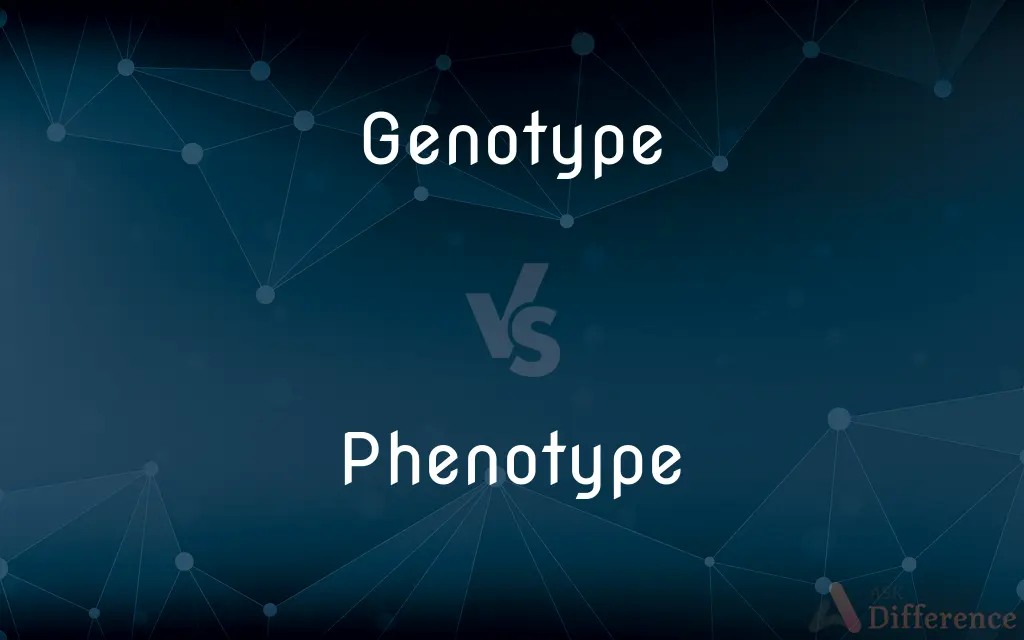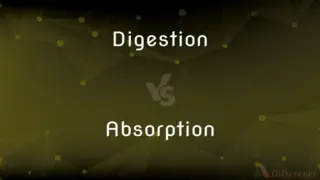Genotype vs. Phenotype — What's the Difference?
Edited by Tayyaba Rehman — By Fiza Rafique — Updated on November 1, 2023
Genotype is an organism’s genetic makeup, while phenotype is the physical expression of those genes.

Difference Between Genotype and Phenotype
Table of Contents
ADVERTISEMENT
Key Differences
Genotype refers to the genetic material inherited from an organism's parents, the sequence of nucleotides in DNA. Phenotype manifests as the organism's observable characteristics, influenced both by genotype and environment.
The genotype is the underlying instruction set that determines potential traits an organism may have. Phenotype represents the actual traits, which can be seen or measured, such as height, eye color, or blood type.
While the genotype remains fixed for an organism throughout its life, the phenotype can change due to environmental influences. For example, identical twins have the same genotype, but their phenotypes may differ if they live in different environments.
The study of genotype provides information about an organism's possible traits and disease risks. Phenotype, however, gives the practical and apparent characteristics that can be used to study the expression of genes.
Both genotype and phenotype are crucial in the study of genetics and evolution. The genotype contributes to the phenotype, but the environment can modulate the expression of the genotype into the phenotype.
ADVERTISEMENT
Comparison Chart
Definition
Genetic constitution of an organism
Physical appearance and traits of an organism
Visibility
Not directly observable
Directly observable
Stability
Fixed throughout life
Can change with environment
Source
Inherited from parents
Influenced by genotype and environment
Study
Genomics and heredity
Phenotypics and environmental biology
Compare with Definitions
Genotype
A set of genes in DNA responsible for a particular trait.
Researchers studied the mouse’s genotype to understand its disease resistance.
Phenotype
The set of observable characteristics of an organism.
The butterfly’s phenotype includes vibrant wing patterns.
Genotype
An organism's complete set of genetic instructions.
The genotype determines potential responses to medication.
Phenotype
The actualized result of genetic and environmental interactions.
The garden’s diverse phenotypes are influenced by both seed genetics and varying sunlight.
Genotype
The genetic constitution of an organism.
The genotype of the plant shows it carries both dominant and recessive alleles.
Phenotype
The visible or measurable expression of a genotype.
Scientists can alter the phenotype by modifying environmental conditions.
Genotype
The alleles present within an organism’s genome.
His genotype includes the allele for blue eyes.
Phenotype
Physical expression of genetics interacting with the environment.
Nutrition can influence the height aspect of a person’s phenotype.
Genotype
The genetic makeup influencing an organism's potential development.
The genotype can predict the likelihood of hereditary conditions.
Phenotype
The traits that manifest from an organism’s genotype.
Despite their genotype, the twins have distinctly different phenotypes.
Genotype
The genotype of an organism is its complete set of genetic material. However, the term is often used to refer to a single gene or set of genes, such as the genotype for eye color.
Phenotype
In genetics, the phenotype (from Greek φαινο- (faino-) 'showing', and τύπος (túpos) 'type') is the set of observable characteristics or traits of an organism. The term covers the organism's morphology or physical form and structure, its developmental processes, its biochemical and physiological properties, its behavior, and the products of behavior.
Genotype
The genetic makeup, as distinguished from the physical appearance, of an organism or a group of organisms.
Phenotype
The observable physical or biochemical characteristics of an organism, as determined by both genetic makeup and environmental influences.
Genotype
The combination of alleles located on homologous chromosomes that determines a specific characteristic or trait.
Phenotype
The expression of a specific trait, such as stature or blood type, based on genetic and environmental influences.
Genotype
A specific combination of alleles at one or more loci on a chromosome.
Phenotype
An individual or group of organisms exhibiting a particular phenotype.
Genotype
(genetics) The part (DNA sequence) of the genetic makeup of an organism which determines a specific characteristic (phenotype) of that organism.
Phenotype
The appearance of an organism based on a multifactorial combination of genetic traits and environmental factors, especially used in pedigrees.
Genotype
A group of organisms having the same genetic constitution.
Phenotype
Any observable characteristic of an organism, such as its morphological, developmental, biochemical or physiological properties, or its behavior.
Genotype
The type species of a genus; generitype.
Phenotype
To evaluate or classify based on phenotype
Genotype
(transitive) To determine the genotype of.
Phenotype
What an organism looks like as a consequence of its genotype; two organisms with the same phenotype can have different genotypes
Genotype
A group of organisms sharing a specific genetic constitution.
Genotype
The genetic constitution of an organism, specifying the particular alleles at defined loci in the genome; - used with respect to one gene, a specific group of genes, or the entire set of genes within the organism. Contrasted with phenotype.
Genotype
A group of organisms sharing a specific genetic constitution
Genotype
The particular alleles at specified loci present in an organism
Common Curiosities
Do environmental factors influence genotype or phenotype?
Environmental factors do not alter genotype but can greatly influence phenotype.
What is a genotype?
A genotype is the set of genes in our DNA which is responsible for a particular trait.
How does genotype relate to phenotype?
Genotype is the genetic blueprint that, along with environmental influences, determines the phenotype.
Can the same genotype lead to different phenotypes?
Yes, especially if environmental conditions differ significantly.
Can two individuals have the same genotype?
Yes, identical twins have the same genotype.
Are genotypes shared among family members?
Yes, genotypes are inherited and shared among family members.
What part does mutation play in genotype?
Mutations can change an organism's genotype and potentially its phenotype.
What is a phenotype?
A phenotype is the physical expression, or characteristics, of that genetic information.
Is phenotype always visible?
Mostly, but some aspects of phenotype, like blood type, are not immediately visible.
Does phenotype include behavior?
Yes, behaviors can be part of an organism's phenotype.
Can two organisms with different genotypes have the same phenotype?
Yes, this can occur if the dominant traits are the same despite different genotypes.
Can genotypes predict health outcomes?
Genotypes can predict the likelihood of inheriting certain health conditions.
How are genotypes determined?
Through genetic testing and analysis of an organism's DNA sequence.
Does a change in phenotype always indicate a change in genotype?
No, phenotypic changes do not necessarily involve changes in genotype.
Are all diseases related to genotype?
Not all; some diseases are purely due to environmental factors and not genetic predispositions.
Share Your Discovery

Previous Comparison
Sikhism vs. Christianity
Next Comparison
Digestion vs. AbsorptionAuthor Spotlight
Written by
Fiza RafiqueFiza Rafique is a skilled content writer at AskDifference.com, where she meticulously refines and enhances written pieces. Drawing from her vast editorial expertise, Fiza ensures clarity, accuracy, and precision in every article. Passionate about language, she continually seeks to elevate the quality of content for readers worldwide.
Edited by
Tayyaba RehmanTayyaba Rehman is a distinguished writer, currently serving as a primary contributor to askdifference.com. As a researcher in semantics and etymology, Tayyaba's passion for the complexity of languages and their distinctions has found a perfect home on the platform. Tayyaba delves into the intricacies of language, distinguishing between commonly confused words and phrases, thereby providing clarity for readers worldwide.














































